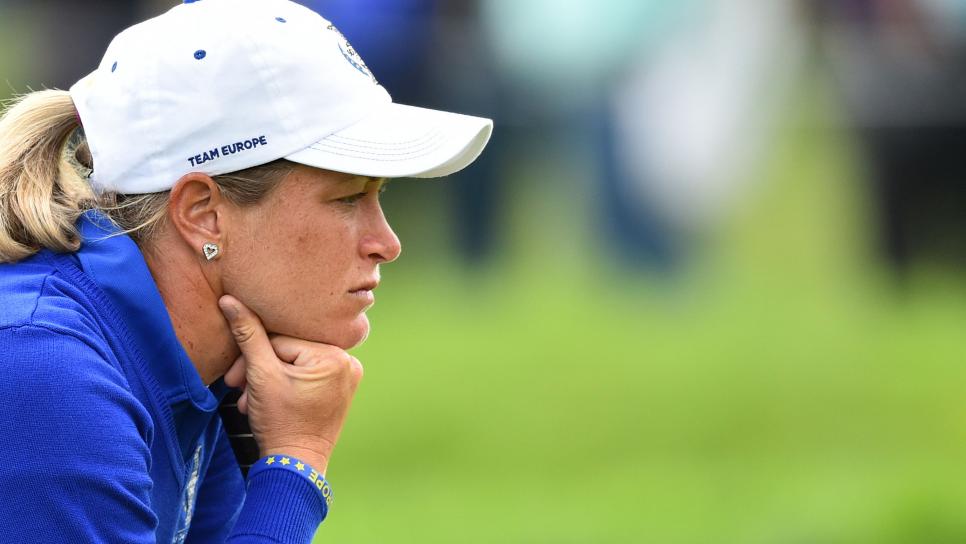News
A Missed Gimme At Sportsmanship

What should the spirit of a golf team match be?
It's not an easy question, and the key word is golf. In other team sports, "no mercy" is a desired mindset. But especially in its team matches, golf has traditionally valued and even demanded gentility and empathy for the opponent. At the same time, the competitive game at the elite level is often a lonely ordeal of fear and nerves. In friendly games, we often spare our opponents the indignities of being exposed to that unforgiving standard -- with the odd mulligan or gimmes from three feet. "Let's just have fun," we rationalize. "Nobody gets hurt." But getting hurt -- and coming back -- is a big part of the championship test, and a bigger part of why we watch. So when it comes to team matches like the Ryder Cup, the just-completed Solheim Cup and the upcoming Presidents Cup, should there be a middle ground? How much should we expect "sportsmanship" to factor into the modern iteration of these matches, when the participants know that losing will subject them to cruel judgment by a world audience filled with fervent partisans. It's not an easy answer. Romantics cite Jack Nicklaus giving Tony Jacklin a shortie on the final hole of the 1969 Ryder Cup. The concession left U.S. captain Sam Snead -- who once missed a 30-incher to lose the U.S. Open -- livid, but it remains the most enduring act in Ryder Cup history. So was Suzann Pettersen a villain, or a tightly wound competitor so swept up in the most emotional event in the women's game that she lapsed into "just win, baby" territory? Or even. . . just a golfer? In match play, waiting for a crucial chance to suddenly and shockingly force an opponent to putt from a distance that had previously been conceded is a nuance of the game's psychological warfare. Pettersen might have felt she had young Allison Lee set up for just such a moment on the 17th hole of their tense fourball match. Lee mistakenly scooped up her 20-incher like a routine concession, but if she'd had to putt it to keep from going 1 down, she would have felt nerves. The putt was the same length as the missed 72nd hole "tap-in" that tragically kept I.K. Kim from winning the 2012 Kraft Nabisco Championship. Pettersen had every right to object to Lee picking the ball up when no words by either European player were said. But with the option of having Lee replace her ball and stroke the putt -- or simply to change her mind and concede the putt -- Pettersen -- by insisting the Americans lost the hole -- made the wrong choice. She violated the unspoken code of team play. Because failure in such matches goes beyond the individual and can cause devastating scars from letting down teammates, captains and country, players have more compassion for the plight of their opponents. Everybody gets hurt in competitive golf, but in team golf, no one wants the hurt to be the worst kind. (Pettersen issued an apology for her actions the following day.)
On the same day as the Pettersen/Lee incident, a similar situation occurred at the PGA Cup -- which matches club pros from the U.S. against a squad from Great Britain and Ireland -- played at CordeValle in San Martin, CA. Stuart Deane of the U.S. won the 11th hole of his match against David Dixon of GB&I because Dixon picked up a six-inch putt that Deane had not conceded. But in this case, when Allen Wronowski, the PGA's Honorary President and captain of the U.S. team, learned what had happened, he found Deane -- who was 3 down -- on the 13th hole and ordered him to concede the 14th hole, which Deane did. Dixon went on to win the match 4 and 3, and GB&I triumphed 13 1/2 to 12 1/2. Wronowski followed the Nicklaus model of team golf -- play hard but with heart -- and leave the arena deeply respected by your peers and followers. When the fiery Pettersen -- a likely Hall of Famer -- looks back, that lost chance is what she'll regret the most.